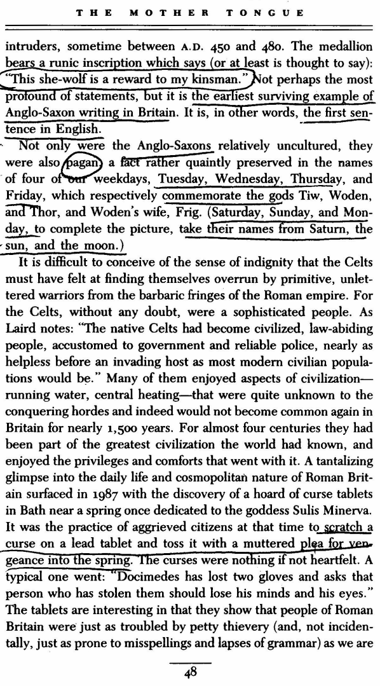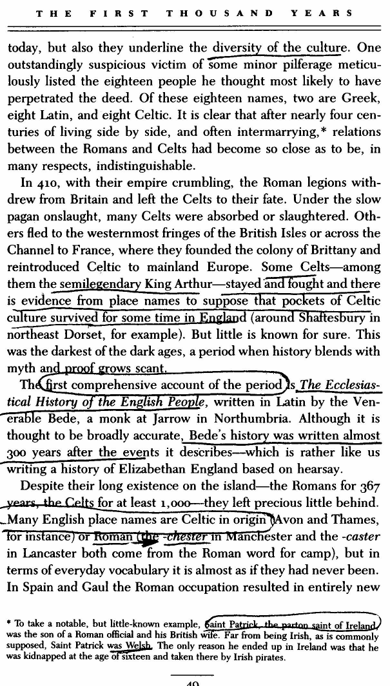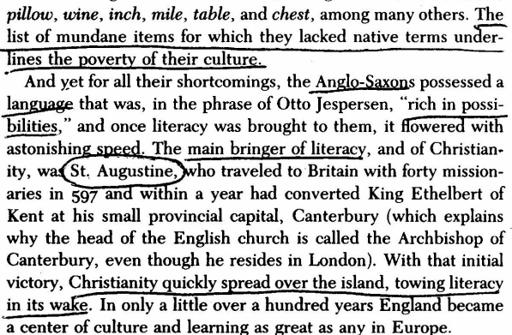The Mother Tongue (6 page)
Authors: Bill Bryson

eyes of outsiders: Llwchmynydd, Bwlchtocyn, Dwygyfylch, Cw-mystwyth, Pontrhydfendigaid, and Cnwch Cock Given such awesome phonics it is perhaps little wonder that Prince Charles had endless difficulties mastering the language be-fore his investiture as Prince of Wales in 1969. In this he is not alone. Almost 8o percent of all Welsh people do not speak Welsh.
Although the country is officially bilingual and all public signs are in Welsh as well as English, the Welsh language is spoken hardly at all in the south, around the main industrial cities of Swansea, Cardiff, and Newport, and elsewhere it tends to exist only in pock-ets in the more remote inland areas.
That it has survived at all is a tribute to the character of the Welsh people. Until well into this century Welsh was all but ille-gal. It was forbidden in schools, in the courts, and at many places of work. Children who forgot themselves and shouted it on the playground were often forced to undergo humiliating punishments.
Now all that has changed. Since the 196os the British government has allowed Welsh to become an official language, has permitted its use in schools in predominantly Welsh-speaking areas, allowed people to give court evidence in Welsh, and set up a Welsh tele-vision station. Welsh, according to
The Economist,
is now "the most subsidised minority language in the world." Discussing the advent of 5 4C, the Welsh-language television station, it observed:
"Never mind that it costs £ 43 million a year to broadcast to the
20
percent of the population of Wales who speak Welsh, who in turn make up only 1 percent of the population of Britain."
All of this was secured for the Welsh people only after a long campaign of vandalism, in which road signs were painted over, television masts torn down, and weekend cottages owned by En-glish people set alight. More than a hundred people were impris-oned during the campaign. Today, although still very much a minority tongue, Welsh is more robust than many other small European languages—certainly in much better health than the Breton language of France, its closest relation. (Breton and Welsh are so close that speakers from the two regions can converse, though they have lived apart for 1,50o years.) Its numbers are falling, but it is still spoken by half a million people.
THE MOTHER TONGUE
The position is somewhat less buoyant for the Gaelic of Ireland.
There too the government has been a generous defender of the language, but with less visible success. Ireland is not even officially an English-speaking country. Yet 94 percent of her citizens speak only English and just i percent use Gaelic as their preferred lan-guage. Ireland is the only member of the Common Market that does not insist on having its own language used in community business, largely because it would be pointless. The dearth of Gaelic speakers does convey certain advantages to those who have mastery of the tongue.
The Spectator magazine
noted in 1986 how Dr. Conor Cruise O'Brien would respond to an awkward question in the Dail, or lower house of parliament, by emitting a mellifluous flurry of Gaelic, which most of the members of his audience could but admire if not even faintly understand.
The Irish-speaking area of Ireland, called the Gaeltacht, has been inexorably shrinking for a long time. Even before the potato famine of 1845 drove hundreds of thousands of people from the land, only about a quarter of the population spoke Gaelic. Today Gaelic clings to a few scattered outposts, mostly along the rocky and underpopulated west coast. This has long been one of the most depressed, if fabulously scenic, areas of Europe. The government has tried to shore up the perennially faltering economy by bringing in tourists and industry, but this has put an inevitable strain on the local culture. In the 197os the population of Donegal, the main Irish-speaking area, increased by a fifth, but the incomers were almost entirely English speakers who not only cannot speak Gaelic but have little desire to learn a language that is both difficult and so clearly doomed.
*All the evidence suggests that minority languages shrink or thrive at their own ineluctable rate. It seems not to matter greatly whether governments suppress them brutally or support them lav-ishly. Despite all the encouragement and subsidization given to Gaelic in Ireland, it is spoken by twice as many people in Scotland, where there has been negligible government assistance. Indeed, Scottish Gaelic is one of the few minority languages in the world to be growing. Gaelic was introduced to Scotland by invaders from Ireland thirteen centuries ago and long held sway in the more
GLOBAL LANGUAGE
remote islands and glens along the western side of the country.
From 8o,000 speakers in 1 96o the number has now crept up to a little over 9o,000 today. Even so, Gaelic speakers account for just 2.5 percent of the Scottish population.
ABut almost everywhere else the process is one of slow, steady, and all too often terminal decline. The last speaker of Cornish as a mother tongue died
200
years ago, and though constant efforts are made to revive the language, no more than fifty or sixty people can speak it fluently enough to hold a conversation. It survives only in two or three dialect words, most notably
emmets ("ants"),
the word locals use to describe the tourists who come crawling over their gorgeous landscape each summer. A similar fate befell Manx, a Celtic language spoken on the Isle of Man, whose last native speak-ers died in the 196os.
The Gaelic of Ireland may well be the next to go. In 1 983, Bord na Gaelige, the government body charged with preserving the language, wrote: "There is very little hope indeed that Irish will survive as a community language in the Gaeltacht beyond the end of the century"—an uncharacteristically downbeat, if sadly realis-tic, assessment.
;{We naturally lament the decline of these languages, but it is not an altogether undiluted tragedy. Consider the loss to English lit-erature if Joyce, Shaw, Swift, Yeats, Wilde, Synge, Behan, and Ireland's other literary masters had written in what is inescapably a fringe language. Their works would be as little known to us as those of the poets of Iceland or Norway, and that would be a tragedy indeed. No country has given the world more incompara-ble literature per head of population than Ireland, and for that reason alone we might be excused a small, selfish celebration that English was the language of her greatest writers.
4.
THE IFS ST
I D'
THOUSAND YEA S
I N THE COUNTRY INNS OF A SMALL
corner of northern Germany, in the spur of land connecting Schleswig-Holstein to Denmark, you can sometimes hear people talking in what sounds eerily like a lost dialect of English. Occa-sional snatches of it even make sense, as when they say that the
"veather ist cold" or inquire of the time by asking, "What ist de clock?" According to Professor Hubertus Menke, head of the Ger-man Department at Kiel University, the language is "very close to the way people spoke in Britain more than i,000 years ago."
[ Quoted in
The Independent,
July 6, 1g87.1 This shouldn't entirely surprise us. This area of Germany, called Angeln, was once the seat of the Angles, one of the Germanic tribes that 1,5oo years ago crossed the North Sea to Britain, where they displaced the native Celts and gave the world what would one day become its most prominent language.
Not far away, in the marshy headlands of northern Holland and western Germany, and on the long chain of wind-battered islands strung out along their coasts, lives a group of people whose dialect is even more closely related to English. These are the 300,000
Frisians, whose Germanic tongue has been so little altered by time that many of them can, according to the linguistic historian Charl-ton Laird, still read the medieval epic
Beowulf
"almost at sight."
They also share many striking similarities of vocabulary: The Fri-sian for boat is
boat (as
compared to the Dutch and German
boot),
rain is
rein
( German and Dutch
regen),
and goose is
goes
( Dutch and German
gans).
In about
A.D. 450,
following the withdrawal of Roman troops
THE FIRST THOUSAND YEARS
from Britain, these two groups of people and two other related groups from the same corner of northern Europe, the Saxons and Jutes, began a long exodus to Britain. It was not so much an inva-sion as a series of opportunistic encroachments taking place over several generations. The tribes settled in different parts of Britain, each bringing its own variations in speech, some of which persist in Britain to this day—and may even have been carried onward to America centuries later. The broad
a
of New England, for instance, may arise from the fact that the first pilgrims were from the old Anglian strongholds of Norfolk, Suffolk, and Essex, while the pro-nounced r of the mid-Atlantic states could be a lingering conse-quence of the Saxon domination of the Midlands and North. In any case, once in Britain, the tribes variously merged and subdivided until they had established seven small kingdoms and dominated most of the island, except for Wales, Scotland, and Cornwall, which remained Celtic strongholds.
That is about as much as we know—and much of that is suppo-sition. We don't know exactly when or where the invasion began or how many people were involved. We don't know why the invaders gave up secure homes to chance their luck in hostile territory.
Above all, we are not sure how well—or even if—the conquering tribes could understand each other. What is known is that although the Saxons continued to flourish on the continent, the Angles and Jutes are heard of there no more. They simply disappeared...al though the Saxons were the dominant group, the new nation grad-ually came to be known as En • land and its language as English, after the rather more obscure Angles. Again, no one knows quite why this should be.
The early Anglo-Saxons left no account of these events for the simple reason that they were, to use the modern phrase, function-ally illiterate. They possessed a runic alphabet, which theyused to scratch inscriptions on ceremonial stones called runes (hence the term
runic)
or occasionally as a means of identifying valued items, but they never saw their alphabet's potential as a way of commu-nicating thoughts across time. In 1982, a gold medallion about the size of an American fifty-cent piece was found in a field in Suffolk.
It had been dropped or buried by one of the very earliest of the


`TU

THE MOTHER TONGUE
languages, Spanish and French, but in Britain they left barely five words [according to Baugh and Cable, page 8o], while the Celts left no more than twenty—mostly geographical terms to describe the more hilly and varied British landscape.
This singular lack of linguistic influence is all the more surprising when you consider that the Anglo-Saxons had freely, and indeed gratefully, borrowed vocabulary from the Romans on the continent before coming to the British Isles, taking such words as
street,
No one, of course, can say at what point English became a separate language, distinct from the Germanic dialects of mainland Europe. What is certain is that the language the invaders brought with them soon began to change. Like the Indo-European from which it sprang, it was a wondrously complex tongue. Nouns had three genders and could be inflected for up to five cases. As with modern European languages, gender was often arbitrary.
Wheat,
for example, was masculine, while
oats
was feminine and
corn
neuter [cited by Potter, page 25], just as in modern German
police
is feminine while girl is neuter. Modern English, by contrast, has essentially abandoned cases except with personal pronouns where we make distinctions between
I/me/mine , he/him/his ,
and so on.
